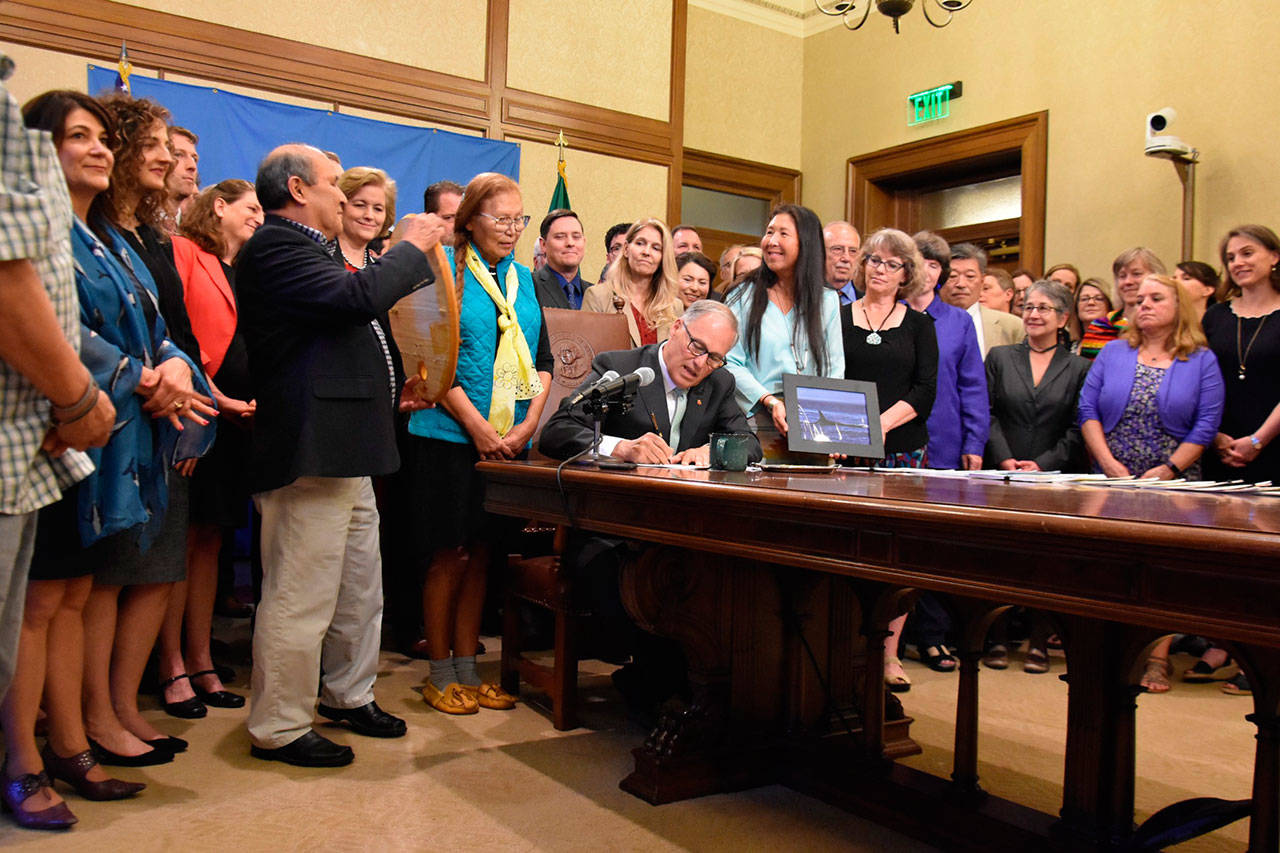Last week, members of Gov. Inslee’s orca task force watched as a number of measures were signed into law aiming to bolster salmon numbers and stop the decline of southern resident orcas.
The legislation covers a swath of protections, from establishing additional safety protocols to guide oil shipments, to requiring that vessels maintain a safe distance from the whales.
A third bill imposes additional precepts for whale watching, and another gives the Department of Ecology and other agencies more leeway to regulate toxic pollution.
A fifth bill, HB 1579, lifts restrictions on recreational fishing of some species that prey on salmon smolts, namely bass, walleye, and channel catfish. It also made an important change prompted by conversations within the task force regarding permitting agencies and their authority to fully apply and enforce current state law.
Part of that change involved updating the decades-old Hydraulic Code, which protects aquatic habitat from development impacts.
Under the bill, the Department of Fish and Wildlife may now issue, deny, or modify permits for construction projects such as the installation of bulkheads on private property, providing the agency more oversight than it previously had.
It was sponsored by Rep. Joe Fitzgibbon (D-West Seattle) who represents Vashon.
“The majority opinion in the legislature is that we needed our fish habitat protection laws to be meaningful and enforceable,” said Fitzgibbon in a phone interview.
Previously, the department was unable to enforce or regulate in a capacity advocates believed was effective enough. But now the agency has the ability to issue fines and stop work orders considered necessary to protect habitat. It also stipulates that a “reasonable timeline” to bring a project into compliance be provided to property owners.
Fitzgibbon said there were few legitimate arguments opponents could make against passing the bill.
“As a first step in terms of starting orcas on the path to recovery, I think people really felt positive about that,” he said, praising islander Amy Carey, executive director of Sound Action and a member of the task force’s prey availability working group, for her role in highlighting deficiencies of current law written to protect habitat. He noted that their collaboration began with protesting the Maury Gravel Mine more than 10 years ago, an effort which Fitzgibbon joined at the time.
Fitzgibbon added that he does not believe the orca population is going to turn around in one day and that fish habitat restoration work is a long term effort, but that he considers the new habitat protection law to be in the category of a long term win.
The legislation signed into law, said Fitzgibbon, was buoyed by attention to the ongoing orca crisis as well as a democratic majority in Olympia.
“This was finally the year,” he said.
While they continue to face starvation due to the loss of chinook salmon which they depend on, the southern residents have enjoyed some brighter occasions this year, such as the birth of a young whale in January to Matia (L77), a 31- year-old member of L pod.
The birth is the first documented success for the southern residents in three years as their population remains at a historic low of 75, an especially sobering fact when bearing in mind last year’s gripping display by Tahlequah (J35), who carried her dead calf with her for 17 days, captivating the world.
Joseph Bogaard, executive director of the Save Our Wild Salmon Coalition, said the suite of bills is very significant to Washington and the nation for the precedent it sets and progress it initiates.
“From the standpoint of environmental policy … the legislature made very significant achievements and accomplishments that haven’t been seen in a very long time in Olympia, and folks are really encouraged by that,” he said.
Crediting Fitzgibbon, he noted that advocacy for more ambitious action will be necessary going forward to continue addressing the issues the legislation sets out to do.
“We’ve got a couple of major jobs ahead of us,” he said, among them the slowing and reversing of carbon production in the state. Bogaard added that he was hopeful for productive group sessions between stakeholders in their upcoming conversations about removing the four Lower Snake River dams.
Last month, the legislature set aside $750,000 in the two-year operating budget to create a forum intended to start discussions between those who have a connection to the river systems and those proposing making alterations to them. Facilitated by a third party of local, state, tribal and federal stakeholders, the discussions will consider ways to benefit salmon while meeting the needs of the communities which depend on the dams.
Bogaard said increasing spill at existing dams to allow for the passage of salmon will be critical in the near term to help orcas, and the sooner a conversation begins to address making such a change, the better.
“People have got to be working together,” he said. “If we don’t do that, we’re all going to be worse as a result.”
For her part, Carey said the passage of the legislation was “a game changer.” She said the exciting scene in Olympia looked like general admission at a rock concert.
“Things are going to happen differently because of Tahlequah and what we know now,” she said. “There’s a very real action-focus going on right now and that’s unlike what we’ve seen for a long time.”



